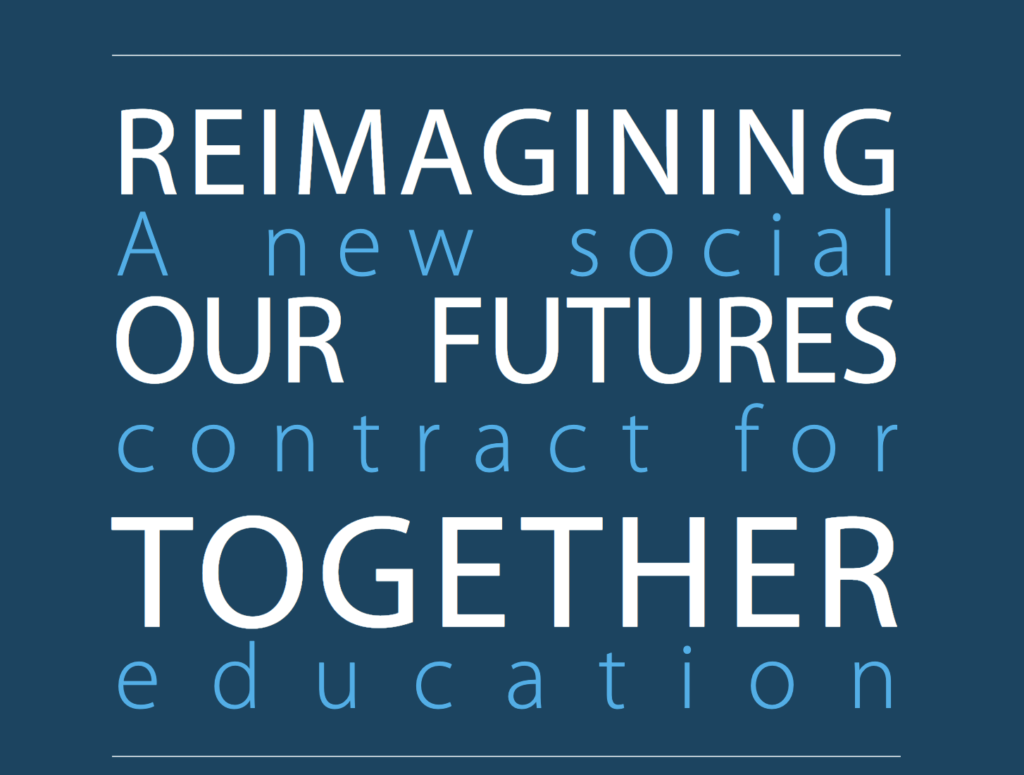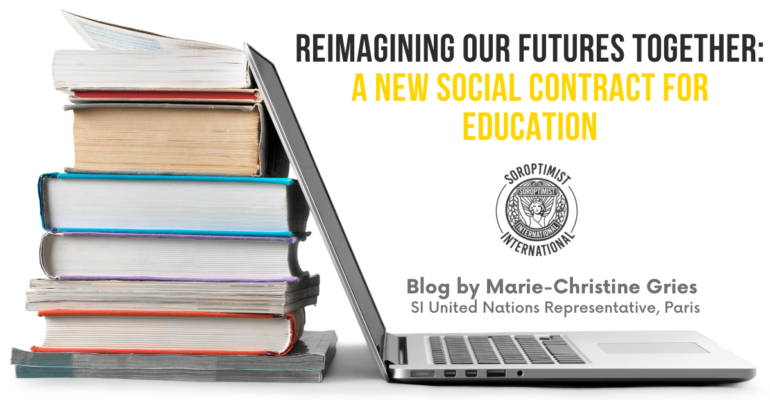Blog by Marie-Christine Gries, SI United Nations Representative, Paris.
The current world is experiencing an unprecedented set of upheavals that profoundly destruct the lives of the inhabitants of the planet; climate change and environmental deterioration are a major concern. There is a widening of inequalities, between the richest and the poorest, and the gender gap still remains. Faced with such challenges, humanity today has crucial decisions to make, to ensure the future is a sustainable and peaceful one.
Questioning Education
Training citizens with knowledge, critical thinking and discernment to build their lives, committed to building this better common future, is the fundamental role of education. But current education needs to include learning about the culture of equality, democracy, solidarity and living together as global citizens.
As a leader in the field of education for the United Nations, UNESCO believes that the current education system needs to be rethought more deeply.
In 2019, during the 40th UNESCO General Conference, the Director-General launched the creation of the International Commission of multidisciplinary experts (from political science to art, research and industry) with the mission of reporting on the future of education to the 41st session of the 2021 General Conference.
While the work of the Commission was just beginning, education has been disrupted around the world by the COVID-19 pandemic.
COVID-19: Education in Disarray
The interruption of school and university curricula has affected at its peak 1.6 billion apprentices, from school to university. Alternatives to the closure of schools, distance education, radios or digital solutions, could not be implemented everywhere, nor fairly at the national level and even less at the global level. The closure of schools has blocked the equal opportunities given to all children receiving a common education. The most vulnerable have suffered the greatest harm, seeing a total drop out of school for lack of access to palliative solutions, which for many of them will be decisive. Girls make up the majority of those left behind, whereas before the pandemic 130 million of them were already out of school. It is estimated that more than 11 million girls will not return to school. A large number of them are threatened by early marriages.
Within a few months, the slow progress of several years of fighting inequality was annihilated. This disaster has highlighted the global fragility of the education system.
A New Social Contract for Education

The UNESCO report, ‘Reimagining our futures together’.
Inspired by the Commission, to affirm the importance of the paradigm shift, UNESCO presented education as a new social contract – an agreement of cooperation between all parts of society to achieve a result beneficial to all by overcoming discrimination, marginalisation and exclusion. This social contract is based on the common acceptance of values, organisational principles, a consensus on the purpose of education, and finally the concrete implementation in a jointly financed project.
The work of the Commission involved several thousand people, and contributions came from all parts of the world. The continuation of the work on developing the education model of the future must respect the same conditions of multilateral and multidisciplinary global work, as well as the diversity of state cooperators and Civil Society.
The Fundamentals of the Contract
“Guaranteeing the right to quality education throughout life” – Article 26 of the Universal Declaration of Human Rights.
The extension of the right to education takes into account the rapid development of knowledge and techniques and gives everyone the opportunity to update their skills. This right includes access to information, culture, science, and the right to access the knowledge community, a freely shared common knowledge heritage. It is indeed an update of the concept of education and the extension of its content to areas whose important role in the construction of our societies is better recognised today. The notion of a common heritage for all, existing for cultural property is extended to all knowledge and sciences. UNESCO have also presented their recommendation on Open Science that would take the sciences essential to humanity out of the field of marketisation.

Image courtesy of UNESCO website.
A Worldwide Collective Research Programme
Education must no longer run behind changes in order to adapt to them, it must anticipate them in order to shape citizens capable of managing them. The conclusions of the Commission’s report provide initial guidance.
It is therefore a question not only of adding content but also of setting up a new pedagogy, training teachers, integrating technological means and even reviewing the design of schools, times and space. Everything is being called into question, with urgent priorities:
Climate change
In order to prepare citizens to face climate change, educational content must integrate environmental issues, ecology and the preservation of resources and the natural spaces much more widely.
Digital learning and digital divide
Digital knowledge must continue to be developed at school. However, this education must include media and information education with a particular focus on the development of faculties of analysis, discernment and critical thinking. This is indispensable for learners to be able to distinguish relevant information in the stream from unnecessary messages and fake news.
With regard to the use of digital education, these tools have proven their usefulness during the pandemic. In an ordinary situation, their use is an appreciable complement for teaching. But in no case should they replace teachers, because the human relationship in its emotional dimensions is essential for learning about social life.
Gender equality at all levels of education
Special efforts and curricula are needed to overcome exclusions of girls, refugees, and people with disabilities. Technological skills must be strengthened with a special effort to bridge the gap in the commitment of girls in these disciplines.
A programme for 2050
The new pedagogy to elaborate should emphasise methods that promote the spirit of solidarity, cooperation, mutual assistance, openness to exchange, acceptance of cultural diversity, elimination of discrimination, development of collective work.
It is necessary to reduce the inequality of equipment between countries, by providing a significant effort for places that lack sufficient equipment and internet connection.
Finally, the place of teaching must remain the school, which does not exclude an ecological design of the school and a redevelopment of school spaces and times that would better suit new content and forms of work.
The ambition of this social contract project naturally involves a very substantial international investment. To this end, this contract includes a rather complex financing management mechanism, involving all countries in a solidarity approach.
Let’s hope that this will be a reversal of the current global trends of reducing education budgets, which are nevertheless much lower than the needs of a growing population.
To learn more about UNESCO’s work, ‘Futures of Education’, click HERE.

